Review for Ping Pong - Collector's Edition
Introduction
I love Ping Pong. It’s a great story, great characters, and an exception to the usual sports narrative which tend to follow the underdog on the route to success. It’s all in how you tell the story of course, but too many Rocky variations can begin to grate after a while. The protagonists in Ping Pong aren’t underdogs at all, you could say that they are expected to win, so the story is more about differences in, and strength of character than the actual game, and for a story about sports, it can get pretty Zen. Then again, I am talking about the Ping Pong live action movie, which I ‘discovered’ some twelve years ago, eventually sought out a decent DVD release, and which has held pride of place in my movie collection ever since. Ping Pong is one of my favourite Japanese movies, and it’s a film I always turn to when I need an uplifting escape from the world.
I’ve always thought that Fumihiko Sori’s film adaptation of Ping Pong was nigh on perfect, so I have to admit to feeling a little lukewarm on the idea of the Ping Pong anime, wondering just what it could add to the story. On top of that, my first exposure to the animation style of Ping Pong stopped me in my tracks, as it is unlike most anime. Its character designs might be a little reminiscent of Tekkonkinkreet, but the rough and ready motion and split screen energy of the show is really quite ‘non-anime’. Then again, table tennis is a fast and kinetic game that really needs a different approach to make it feel real as a sport in anime, not just a thing that clumsy girls do badly at in onsen episodes. Also the manga was originally published in six volumes, so it’s likely that the film, much as I love it, probably had to be selective in the story that it told. The anime might just enrich this universe, and expand it.
Ping Pong tells the story of best friends, ‘Peco’ Hoshino, and ‘Smile’ Tsukimoto. Their friendship grew around a mutual appreciation of table tennis, and both of them have a heap load of natural talent. In a school that revolves around table tennis and the annual inter-High School tournaments, that is a big deal. But their personalities couldn’t be more different. Peco is brash, cocky and reckless, eschewing practice and hard work, confident in the belief that his natural talent alone is enough to make him world champion, and hustling his way up the ranks at Grandma Tamura’s table tennis dojo. He’s not the perfect player for coach “Butterfly” Joe Koizumi, who works with the school table tennis club, and who sees Smile as his ideal player, more amenable to training and discipline. But Smile is sullen, withdrawn and apathetic (he got the nickname Smile because it’s something he never does), and he lacks motivation, despite his considerable talent, and above all, he doesn’t use the killer instinct in his matches. Peco looks forward to the next tournament as his way onto the national team, while Smile couldn’t care less.
Eleven episodes of Ping Pong: The Animation are presented across two Blu-ray discs from All the Anime.
Disc 1
1. The Wind Makes it Too Hard to Hear
2. Smile is a Robot
3. Staking Your Life on Table Tennis is Revolting
4. The Only Way to be Sure You Won’t Lose is to Not Fight
5. Where Did I Go Wrong?
6. You Love This Sport More Than Anyone!!
7. Yes, My Coach
8. The Hero Appears
Disc 2
9. Gonna Cry a Bit
10. I Thought You Were the Hero!!
11. Blood Tastes Like Iron
Picture
Ping Pong gets a 1.78:1 widescreen 1080p transfer on these Blu-ray discs. It’s an unproblematic, clear and sharp transfer which presents the animation without concerns about compression, aliasing or even digital banding. It is to my eyes a flawless presentation of the show. The question marks arise with the animation itself, which is different to put it mildly. Eschewing the usual animation techniques, it’s stated in the first audio commentary that the show was animated in its entirety (minus the credit sequences) in Flash. That’s the same Flash that causes my web browser to lock up and crash every hour or so. You can certainly see the effect on the animation, which is comparatively rough and lacking in depth, as well as the extreme static nature of the conversation scenes (it’s almost pre-digital lip-flap only animation). The benefits of the animation come across in the action scenes, which present the fast paced ping pong games with energy and vibrancy. You also get a whole lot of split screen (very Ocean’s Eleven) to emphasise the action.
The character designs are atypical to the degree that they border on the grotesque. As mentioned, there is something of the Tekkonkinkreet about the way the characters appear. For me, despite the great action sequences, I found Ping Pong’s animation style to be a distraction from the show, not an enhancement, but your mileage may vary. I do love the credit sequences, particularly the opening sequence, which used more conventional animation techniques, but to create something wholly unconventional. Despite the fact that those 90 seconds of animation usually take up an undue percentage of budget and effort, if the rest of the show had been animated that way, I might have been more impressed. There’s one point in the opening credits where it looks as if the Peco and Smile characters morph into the actors who played them in the live action film, which I find really neat.
The images in this review were kindly supplied by All the Anime.
Sound
You have the choice between Dolby TrueHD 5.1 Surround English and 2.0 Stereo Japanese, with translated subtitles and a signs only track locked to the appropriate audio stream. I stuck to the Japanese track, and was happy with the actor performances, the use of the stereo to bring out the ping pong action, and the show’s rather quirky and unique music soundtrack (The Japanese Blu-ray release came with the soundtrack CD). I gave the dub a brief try to check that it exists, and on brief acquaintance it seemed okay, no particular shocking casting decisions. The subtitles are accurately timed and almost free of error, the sole error being a missing subtitle in episode 5, 1:34.35 into disc 1.
Extras
These look to be the Funimation discs repurposed for Region B. The discs present their content with animated menus. There are no next episode previews at the end of each episode.
Disc 1 autoplays with a trailer for Wolf Children.
The sole extra on disc 1 is the audio commentary on the first episode, with ADR Director Christopher Bevins joined by Micah Solusod (Smile), Mark Stoddard (Koizumi), and Alan Chow (Kong Wenge). It is one of the usual Funimation commentary tracks, but for once I managed to stick it out all the way through. It’s interesting to hear that they dubbed all the Mandarin dialogue in Mandarin again.
Disc 2 autoplays a trailer for Cowboy Bebop (The Funimation Blu-ray), and otherwise holds the bulk of the extra features.
The episode 11 audio commentary features Christopher Bevins again, this time with Aaron Dismuke (Peco), Marcus D. Stimac (Dragon), and Anthony Bowling (Akuma). It’s one of those Funimation commentaries.
The rest of the extras are promotional material, the Japanese Boxset Commercials (1:08), the TV Spots, 5 character based running to a total of 1:23, the Original Trailer, Promotional Videos (1:37), and the US Trailer.
It’s also here that you’ll find the next episode previews, 10 of them running to 2:50 in total.
Finally there are Funimation trailers for Inari Kon Kon, Princess Jellyfish, Michiko & Hatchin, Summer Wars, and Lupin III: The Woman Called Fujiko Mine.
Conclusion
All things being equal, I tend to prefer the version of a show or a movie that I saw first. If I’m being irrational, I might tend to nitpick at tiny aspects to support my opinion, but the truth of the matter is that I usually love both such versions equally, if for different reasons. I’ll always opt for the original Battlestar Galactica, I unabashedly love the first version of Full Metal Alchemist (making its UK Blu-ray debut later this year), and I have to admit to preferring the original live action Ping Pong movie from Fumihiko Sori to the subsequent anime, despite both telling much the same story, with the exact same characters.
So here are the nitpicks I choose to justify my opinion... There are aspects of the animation style that I don’t like, the roughness of the Flash animation, the increased static nature of conversation scenes, the comparative grotesqueness of the character designs. The extra screen-time of the anime allows it to expand on the story, bring more of the manga to life, but this is a mixed blessing. The film concentrated on Peco and Smile, but the anime fleshes out Dragon and China’s characters too. In the case of Kong Wenge, that is a good thing, explaining his arrogance, and his desire to get back to his national team. It also shows more of an arc of redemption for his character, following his first setback. But for Ryuichi Kazama, and the development of his family, it’s less successful, with an awkward relationship with his cousin, and his grandfather introduced as some sort of ping pong magnate. That said it does allow for an interesting dynamic with Grandpa Kazama, Butterfly Jo, and Grandma Tamura. Finally, and most ephemerally, the series isn’t quite as Zen as the movie in my eyes. The show just can’t match the movie when it comes to Dragon and Peco’s moment of ping pong perfection. I’ll stop harping on about the movie now, until someone releases it in the UK on Blu-ray, please?
Really it is the same story, one year in the life of best friends Peco and Smile. Peco loves table tennis, but his attitude is lackadaisical, believing in his natural born talent before hard work and effort. Smile started playing the sport because of Peco, and he too has natural talent, but he has no motivation, and no ambition in the sport, only plays it to pass the time. The school coach Jo Koizumi sees a talent he can nurture, and he brings his full attention to bear on the reluctant Smile. Smile and Peco’s first attempt at a championship goes badly for the both of them. Smile had a bet with the coach that he’d win, but his innate sympathies for his opponent made him throw the game, which meant that he’d submit to Koizumi’s training for the next year. Peco on the other hand lost to a childhood friend with no particular talent for the game, but who put in the hard work and effort, and it’s a loss that rocks Peco back on his heels, and he winds up dropping out of the sport.
The following year sees Smile’s training, and Peco eventually finding his love for the sport again, and this time deciding to put the hard work in, until the characters all meet up the following year for the next prefectural tournament. And of course the show really isn’t about ping pong at all; it’s about character growth, about gaining self-knowledge and strength through personal enlightenment. It is the Zen of ping pong, even if I don’t think the show manages it in quite as successful a way. One thing that the show is better at, is keeping the reason behind Peco and Smile’s friendship obscured until the final episode. The film pretty much spelt it out to the degree that it wasn’t the point of the story any more, but the series makes sure that the full weight of Peco’s friendship with Smile becomes clear in the match during the final episode.
So I’ll always prefer the movie, but the series is pretty fine in its own right. If you like your horizons broad when it comes to the anime that you watch, this different style of storytelling and animation will certainly hold the attention, while the story is great in its own right. Actually you should watch both. Those who watch the series first, can watch the movie afterwards, and then tell me how wrong I am, and why the series is actually better.
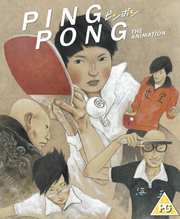
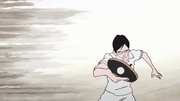
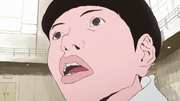
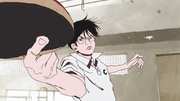
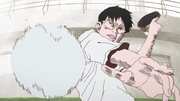
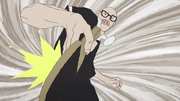
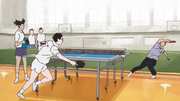
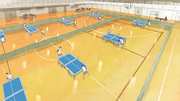
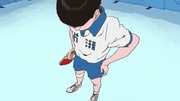

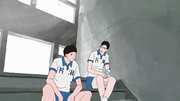
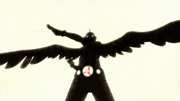








































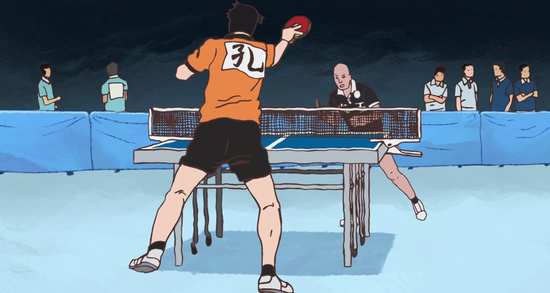


Your Opinions and Comments
Be the first to post a comment!